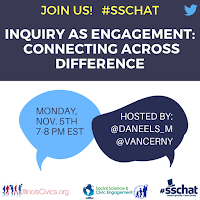Teach like our democracy depends on it — because it does: #NCSS18 recap

by Mary Ellen Daneels, Lead Teacher Mentor Earlier this fall, I was part of a conference put on by Dr. Diana Hess , the Dean of Education at the University of Wisconsin-Madison. The conference t-shirts read, “Teach like our democracy depends on it — because it does.” The recent 98th Annual National Council for the Social Studies conference held in Chicago highlighted this message throughout. IllinoisCivics.org and the Department of Social Science and Civic Engagement at Chicago Public Schools hosted a special strand of Illinois programming around “Inquiry as Engagement: Connecting Across Differences” had the message, <strong>“Engage students like our democracy depends on it — because it does.”</strong> Session attendees learned how deliberation, student voice, and informed action can be leveraged to connect classrooms across cultural, geographic, and socioeconomic differences in this diverse state to promote culturally sustainable teaching. The day concluded with the fir...





